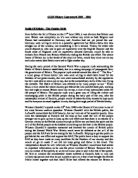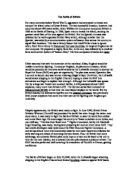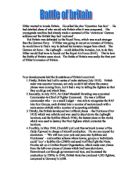An article was published on the 13th August 1940 in the Daily Express, one of Britain’s most popular newspapers. The owner of the Daily Express was good friends with Winston Churchill, prime minister of Britain at the time and played a key role in the propaganda campaign lead by the government. The article tells people to join the war effort, to do there little bit to help their country in a time of great need. How the RAF are heavily outnumbered and how victory depends on the thousands of young heroic men, who are willing to sacrifice their own lives for the freedom of Britain. How every politician should keep working through out the summer break to set an example for the British Public. The Express uses it’s great influence to reassure Britain of a victory and to encourage everyman and women to do there part to defend our great country doing whatever is necessary to ensure our freedom for years to come. The interpretation should be well informed, as a journalist would have had access to some important information. The Express was widely read and highly thought of and so would not of written anything to tarnish their good reputation. However the article is bias and uses emotive language to stir up patriotic thoughts in the mind of the British people. The article is propaganda designed to encourage support for the war and boost the morale and will of the British public not to lie down but to keep going until Hitler has been defeated. The Express was widely read and held in high regard so would not do not do anything to diminish this popularity by criticizing the government and the men fighting for our freedom.
This is a poster, which appeared all over Britain in the months following the Battle of Britain. The poster tells us that the British public should be extremely grateful for the heroic and brave men of the RAF who made numerous sacrifices to defend the freedom of our country. How the RAF were heavily outnumbered but still managed to come out on top, that these few men have saved the lives of million and millions of British civilians. The poster boosts the morale of the British people and encourages them to keep up the war effort as the RAF have fought day and night for our freedom and we don’t want there hard work to go to waste. A recruitment drive for young men to join the RAF as the people will be forever grateful and hold you in high regard for your brave and heroic actions. The interpretation is fairly correct the RAF were heavily outnumbered, but it is very nationalistic, designed to stir up patriotic thoughts in the British people. The poster is a piece of propaganda designed to boost the morale of the British public and the men of the RAF and to encourage people to keep up the war effort.
Sir Arthur Bryant wrote an article in 1944 for the Daily Graphic, one of the most popular newspapers of the time. Sir Arthur Bryant wrote the article in the last year of the war, when Britain was close to victory. Sir Arthur Bryant tells us how a small number of brave and heroic men came out victorious, who were heavily outnumbered by the enemy. How Sir Hugh Dowding, the inspirational leader of men stubbornly defended the lands of Britain, commanding our RAF to victory despite all the odds. How the ordinary man and women helped play their part in Britain coming out victorious in the Battle of Britain. How the Germans made several tactical errors, which eventually lead to their downfall. Sir Arthur Bryant uses the great influence of the Daily Graphic to tell everyman and women we owe a lot to a group of men who fought for our liberty and freedom and to thank the British Public for there hard work and perseverance which lead our great nation to victory. The interpretation should be well informed as Sir Arthur Bryant was a historian and would have had access tom important information. Censorship laws had been relaxed allowing people more freedom to write about certain subjects, which had been off limits before now. However the article is bias and uses emotive language to stir up patriotic thoughts in the minds of the British people. These are only extracts from the article so we have no idea what was said in the other parts of the article. Sir Arthur Bryant was held in high regard and would not of said anything that might jeopardize this position, such as criticizing the government and the military forces.
After the end of the Second World War, the popular myth surrounding the Battle of Britain began to disappear. Historians of the time were focusing far more on the poor decisions made by Adolf Hitler during the war and how they shaped the downfall of the empire he had tried to create and not so much on “ The few “ who kept our skies safe from the enemy. The relaxing of the Censorship Law allowed people to write far more freely, without the fear of coming under scrutiny from the government of Britain There was no need to be over patriotic in this period, Britain was no longer involved in war, so there was no need for nationalistic, inspirational words from politicians and historians to boost the morale of the people of the Britain.
David Thompson’s book Europe Since Napoleon was written over 10 years at the end of the Second World War in 1957. The book surveys the whole of European history since 1815. David Thompson was held in high regard, a graduate of Cambridge University, his books were very popular with the British public, especially with students. David Thompson tells us how Adolf Hitler never really had the desire to attack Britain; instead he would have preferred a peaceful end to the matter. Hitler was far too concerned with the seizure of Russia. Hitler dropped plans for a full-scale invasion of Britain and instead would bomb the British people into submission. How a number of brave and heroic were willing to sacrifice their blood for our freedom. How not all the man in the RAF were British but were made up of a number of different nationalities such as Czech and Polish. People were made to believe that every single man in the RAF was British due to a strong propaganda campaign intended to stir up patriotic thoughts and recruit more men to help the war effort. David Thompson uses the influence over people to make sure they never forget the brave actions of the RAF, who were to lead Britain to victory and that the Battle of Britain to some extent was a success due to poor tactical miscalculations and ignorance by the enemy. The interpretation should be well informed as David Thompson was a historian and would have had aces to important information. Censorship had been relaxed allowing historians and journalists to write much more freely. However this is a book on the entire history of Europe since 1815 and is not a book devoted to a specific period in time. Britain had been victorious in the Second World War, so the Battle Of Britain can be look back on as a complete success for the Britain and a total catastrophe for Germany. David Thompson fails to mention the considerable loss of civilian life due to the Blitz, the Second World War was still fresh in the minds of many people and they would of not wanted to be reminded of the terrible loss of life. David Thompson was held in high regard and would not have said anything, which might ruin his reputation.
Winston Churchill’s book Memoirs of the Second Word War was published in 1957, over 12 years after the end of the Second World War. Winston Churchill was the prime minister during the war and was a man held in high regard by a lot of people. He was a keen historian and used his own experiences and extra research to put together this Book, which became very popular indeed. Winston Churchill tells us how the key to victory would be air supremacy over the English Channel. How Lord led our men to victory over the enemy with his genius and vigour, crushing anything that got in his way. How a few brave and heroic men made numerous sacrifices to keep our country free. How Hitler was dead set on destroying our great nation, which is complete and utter nonsense as Hitler was far more involved with the Battle for Russia. How the ordinary person persevered, working non-stop to keep our country safe. How adversity always brings out the best in the British people. The interpretation should be well informed as Winston Churchill was prime minister of Britain during the war and would have had access to important information. However he is very nationalistic, intended on stirring up pride in the British people, keeping himself popular with his reputation intact. Winston Churchill fails to mention the considerable loss of civilian life and how Hitler had wished for a peaceful end to Britain, as his attentions were on the Battle for Russia. Sir Hugh Dowding does not even get a mention for his service to our country, he set up the nerve centre for the whole population, but was highly disliked by his comrades and eventually Winston Churchill, he retired in October 1940.
Klaus Schulz’s book From Germany’s Past was published in 1971, some 25 years after the fall of Adolf Hitler. The book is a general history of Germany through out the modern period; his views heavily reflected that of the ordinary people of Germany. Klaus Schulz tells us how Germany was very successful in the first two years of the Second World War, capturing a number of countries, which included France and Poland, but the hard work of the previous years were ruined, due to poor tactical judgements such as the breaking of the Soviet Pact and the unsuccessful invasion of Russia in the winter of 1941 which followed. How the involvement of America, made any chance of a victory disappear, as they did not have the numbers to compete with such a power. Klaus Schulz wrote the book after the war, which Germany had failed to be victorious in. people would not of been to happy to of been reminded of Germany’s dark past and wanted to get on with life and black out this part of their history forever. Klaus Schulz was a historian so would have had access to important information. He is not overly patriotic, which could of put the reliability of the interpretation in jeopardy. However Karl Schulz does not even mention the Battle of Britain or Dunkirk as to him they are not significant to the downfall of Germany and have been immortalised in our proud military history due to a strong proganda campaign from the British government in the Second World War.
AJP Taylor’s introduction to a book entitled Fight By L Deighton was written some 30 years after the end of the war. AJP Taylor was held in high regard and very popular among the British people. He wrote many books about international relations and both of the wars. AJP Taylor tells us how leadership was an integral part of Britain triumphing in the Battle of Britain. Sir Hugh Dowding was a far more superior than his opposite number General Goring, who hardly ever got the tactics right. How Operation Sea Lion did not exist, as the Germans had no desire to capture Britain and would of preferred a peaceful compromise, so they would be able to put their full energy into the Battle for Russia. The Battle of Britain was not a spectacular affair as described by politicians and historians of the time but rather small, which never actually came about as the German were not interested and did not see Britain as of any significance. The RAF were over immortalised by the men in charge of our country in order to boost the morale of the public and recruit new young men to help in the destruction of Germany. AJP wrote the introduction for the book along time after the war, so he could be less careful about what he wrote down on paper and could criticise certain people, who he would not of been able to criticise during the war and shortly after the end of the war. The government had created the myth during the war to keep the morale high of the British people, so they would keep up the War effort and not give up. There is no real purpose to the article such as raising morale or a recruitment drive for men, it is simply an evaluation of the way both sides interpreted the Battle of Britain and it’s importance in the war. The interpretation should be well informed as AJP Taylor is a historian and so would have had access to important information, he is not overly patriotic which could of put the reliability of the source in doubt, he gives a fairly balanced argument focusing on the two sides involved and not just the one.
Christopher Ray wrote an article for the History Review in March 1997, some 50 years after the end of the war. The History review is a magazine intended for use by students studying History for A-Level. Christopher Ray is a lecturer at Birmingham University. Christopher Ray tells us how Adolf Hitler was not fully committed to the Battle of Britain and was far more concerned with the invasion for Russia, which it had been planning for several months prior to the Battle of Britain. Hitler did not want to invade Britain, as there would have been a considerable loss of men, which he needed to help with the invasion of Russia. Hitler made several tactical miscalculations, which still remain a mystery to people today. Britain put the concept of standing alone against the Nazis to get America to get involved in the war Britain had a strong propaganda campaign which over exaggerated the losses of German men during the Battle of Britain to make it seem more of a victory than it actually was. Christopher Ray wrote the article a long-time after the war, with hindsight Christopher Ray can be critical of both sides especially Germany who were unsuccessful in the Second World War. There is no real purpose to the article such as to boost morale or get people to join the war effort it is simply an evaluation of the two sides, which were involved in the Battle of Britain, as it is the intention of the magazine is for it to be read by students studying History for A-Level who need to be able to reach a balanced conclusion about the Battle of Britain to achieve the highest marks possible. The interpretation should be well informed as Christopher Ray is a historian and so would have had access to important information, he is not overly patriotic and gives a balanced argument helping to improve the reliability of the interpretation.
The whole significance of the Battle of Britain in the war was completely exaggerated by the government of the time. The battle for the freedom of Britain, which Adolf Hitler would win at all costs, was a complete lack of lies. Hitler had no desire to actually invade Britain due to the considerable losses of men he would suffer and he was far more concerned with the Battle for Russia and had been planning the invasion of Russia several months prior to the Battle of Britain occurring. The idea of the Battle of Britain was designed to get the people of Britain behind the men and bring us all closer together in a time where Britain needed unity not separation. People were willing to listen to these pack of lies as it made them feel far better than telling them that Hitler couldn’t care less what happened to Britain. The Battle of Britain gave the people of Britain purpose defend our country at all costs, work day and night and support the men and help the people around us. The popular myth of “ The few “ was designed simply as a way of glamorising the occupation of the pilot, encouraging young men to join the RAF and help the government win the war. The RAF were outnumbered but figures were over exaggerated. The men against all odds and come out on top against the victory and the British people could o the same to. The other popular myth was “ The Finest Hour “ designed to inspire pride inside the British people that against all odds, we had come out on top due to our perseverance, and we had put all our differences to one side and united as a nation and got behind the men who needed our support. We had shown the word the resilience and spirit of the people of people that when we are close to defeat we still mage to somehow come out on top. The Battle of Britain was a lie, but not a bad lie; it had united us as a nation and made us feel proud to be British. The people would need this during the tough wartime conditions of Britain. The government had installed in us a sense of indestructibility the people of Britain will never be defeated, we will always come out victorious, however precarious the situation.







